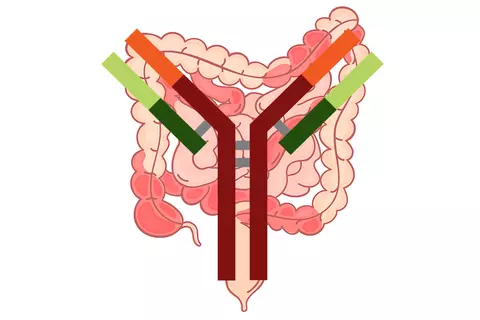Risankizumab in multirefractory Crohn's disease
Alsoud D, Inflamm Bowel Dis. 2024;30(12):2289-2296
In this Belgian real-world multirefractory cohort with moderate to severe Crohn's disease (almost all pretreated with ≥ 4 different advanced therapies including ustekinumab), 58% and 27% of patients treated with the IL-23 antibody risankizumab achieved a steroid-free clinical response and remission after 1 year, respectively.
Background: As real-world data on risankizumab in patients with moderate to severe Crohn's disease (CD) are scarce, the authors evaluated its effectiveness and safety in multirefractory Belgian patients.

Methods: Data from consecutive adult CD patients who started risankizumab before April 2023 were retrospectively collected at 6 Belgian centers. Clinical remission and response were defined using the 2-component patient-reported outcome. Endoscopic response was defined as a decrease in baseline Simple Endoscopic Score with ≥ 50%. Both effectiveness end points were evaluated at week 24 and/or 52, while surgery-free survival and safety were assessed throughout follow-up.
Results: A total of 69 patients (56.5% female, median age 37.2 years, 85.5% exposed to ≥ 4 different advanced therapies and 98.6% to ustekinumab, 14 with an ostomy) were included. At week 24, 61.8% (34/55) and 18.2% (10/55) of patients without an ostomy achieved steroid-free clinical response and remission, respectively. At week 52, these numbers were 58.2% (32/55) and 27.3% (15/55), respectively. Endoscopic data were available in 32 patients, of whom 50.0% (16/32) reached endoscopic response within the first 52 weeks. Results in patients with an ostomy were similar (steroid-free clinical response and remission, 42.9% and 14.3%, respectively). During a median follow-up of 68.3 weeks, 18.8% (13/69) of patients discontinued risankizumab, and 20.3% (14/69) of patients underwent CD-related intestinal resections. The estimated surgery-free survival at week 52 was 75.2%. No new safety issues were observed.
Conclusions: In this real-world cohort of multirefractory Crohn's disease patients, risankizumab was effective in inducing both clinical remission and endoscopic response. Risankizumab was well tolerated with no safety issues.
DOI: 10.1093/ibd/izad315